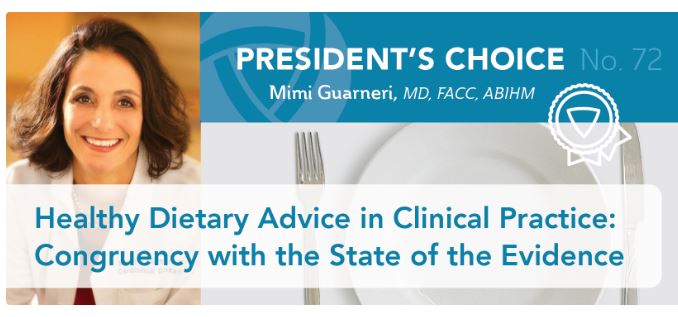
HEALTHY DIETARY ADVICE IN CLINICAL PRACTICE: Congruency with the State of Evidence, AIHM President’s Choice #72
(Click on title for graphics/images. Source: AIHM) Healthy Dietary Advice in Clinical Practice:
Congruency with the State of the Evidence
…I recently stumbled upon an interesting article in a journal I don’t normally read—American Family Physician—entitled, “Nutrition Myths and Healthy Dietary Advice in Clinical Practice,” and wondered to myself whether the content would be consistent or not with a scholarly model of integrative health and medicine. I was pleased to find that the principles offered in this short article by Leonard Lesser, MD, MSHS, Mary Carol Mazza, PhD, AM and Sean Lucan, MD, MPH, MS were generally resonant with integrative messaging over the past several years.
…Here is a summary of the myths and the corrected truths associated with them as summarized in the article:

…Myth #1: Patients need to focus on consuming enough calcium for bone health.
…The role of calcium in strengthening bones is actually unclear. Though Americans have among the highest calcium intake in the world, they also have one of the highest rates of osteoporosis. Furthermore, consuming dairy foods does not clearly benefit bone health. Astoundingly, calcium supplementation with vitamin D had only small effects on fracture prevention, with a number needed to treat of a staggering 1000 postmenopausal women and older men living independently to prevent one hip fracture. In addition to the possible potentiation of kidney stones with calcium supplementation, cardiovascular risk with is another concern, and the evidence continues to evolve.

…Myth #2: Dietary fat leads to obesity and is detrimental to vascular health.
…Because fat is the macronutrient with the highest number of calories per gram, the primary concern is that fat leads to higher calorie intake and therefore, obesity. However, studies are showing that higher calorie fatty foods and higher fat diets incur and sustain weight loss as much or more than lower fat diets. The evidence is mounting that saturated fats may not be a primary driver of cardiometabolic disease or mortality. A Cochrane review found no effects on cardiovascular or all-cause mortality with reduction of saturated fat or with substituting other fats for saturated fat. Consuming ultra processed saturated fats, such as in preserved meats, is associated with significant increases in cardiovascular and all-cause mortality, wheres consuming whole foods high in saturated fats has been inversely associated with cardiovascular disease and cardiometabolic risk factors such as DM2 and obesity.

…Myth #3: All types of fiber are beneficial.
…It is well accepted that dietary fibers from whole plants (fruits, vegetables, nuts, grains and seeds) are important for good health. Functional fibers, on the other hand, are components of ultra-processed foods and include polydextrose, resistant starch, chitosan and indigestible dextrins; they are generally produced in a lab and injected into ultra-processed foods to increase their fiber content. Because the USDA does not distinguish between natural plant dietary fiber and functional fibers, consumers may get the idea that functional fiber is health producing, despite the fact that there is no evidence to demonstrate beneficial effects from functional fiber, which can lead to GI distress and malabsorption of other nutrients. Patients should be encouraged to steer clear of functional fiber and its associated ultra-processed foods.

…Myth #4: 3500 calories translates to a pound of body weight.
…Ah, finally we understand that, as Jeff Bland has been telling us for decades, humans are not calorimeters. The authors’ declaration here: “The ‘3500 calorie’ rule is oversimplified and does not take into account the dynamic, nonlinear response of the body weight to sustained changes in calorie balance. When individuals lose weight, compensatory mechanisms work to prevent further weight loss and promote regain.” They add that a better strategy for adults would be to maintain a deficit of 100 calories per day, to avoid processed foods and to consume whole foods.
…Their commentary at the end regarding healthy dietary advice is wise; though various diets have been proposed for weight loss, none is decidedly superior to the others, though they share a consistent theme of eating whole, unprocessed foods, which leaves room for variation such as the inclusion or exclusion of animal products and grains.
…It’s gratifying when we observe the gap diminish between ideologies that have sometimes seemed completely disparate from one another. Sound science lays the foundation for good medicine; integrative health and medicine includes conventional medicine, of course, and we find ourselves amid a shift in thinking that acknowledges the sameness between conventional and integrative paradigms when we level ourselves to high quality evidence and clinical experience. Thank you, American Family Physician, and Drs. Lesser, Mazza and Lucan, for illuminating the importance of these concepts and moving us forward on our path to greater understanding together.
Blessings on your journey,
Mimi Guarneri, MD, FACC, ABIHM
AIHM President

You must be logged in to post a comment.